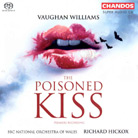March 2004
The libretto, by Evelyn Sharp, was based on a short story by Dr. Richard Garnett, The Poison Maid, which in turn was derived from Rapaccini’s Daughter by Nathaniel Hawthorne. From the beginning the composer and librettist were at odds as to the nature of the work, vacillating between romance and comedy. It was constructed with spoken dialogue, like Mozart’s The Magic Flute, which allowed for some dated and ridiculous dramatic lines falling between stretches of magnificent music. This is mature Vaughan Williams, with the composer writing folk-inspired melodies of exquisite beauty for the two sets of lovers, as well as colorful and energetic music for the character singers and chorus. The opera is loaded with drama and good humor. The spoken dialogue is omitted from the CD set, which makes it easier to concentrate on the excellent qualities of the music. The dialogue is included in the libretto and set off with a gray background so it can be easily spotted. The performers are simply wonderful to a man and woman. There is not a weak link anywhere, and conductor Richard Hickox obviously loves this music, giving it careful attention and care without sacrificing any enthusiasm. The BBC Orchestra of Wales plays with finesse and ardor. All of the soloists, as well as the chorus, enunciate with remarkable clarity. The recording is a little far back for my taste, as is usually the case with Chandos, but the front stage has very adequate width and exceptional depth. The advanced resolution of the SACD tracks makes the smallest nuance in vocal inflection quite audible. As is quite often the case in operas about magic, there is a lot of thunder and wind, and these effects are adroitly wrapped into the back channels in the multichannel version. It all sounds quite appropriate and might serve as an example to other producers. Multichannel can be used for classical music without producing an aberration. I do wish there had been a different break point between the discs. Act II is split, and by my timings, I am not sure it needed to be. Disc one could have run very long, close to 80 minutes and disc two could have included merely Act III and perhaps a filler work. Don’t let that stop you from hearing this glorious, previously unknown, music. GO BACK TO: |
 Vaughan Williams - The
Poisoned Kiss
Vaughan Williams - The
Poisoned Kiss Ralph Vaughan Williams is not noted as an opera composer, yet he
wrote three very good ones. Some of you may know recordings of Hugh the Drover and Sir
John in Love. In fact, there have been several of each of those works, but The
Poisoned Kiss has languished unheard by most listeners until now. It is an opera that
tells the story of a young woman enchanted by a sorcerer. She must exist on poisons. Thus,
the young man who loves her will surely perish if he experiences her lips, her poisoned
kiss.
Ralph Vaughan Williams is not noted as an opera composer, yet he
wrote three very good ones. Some of you may know recordings of Hugh the Drover and Sir
John in Love. In fact, there have been several of each of those works, but The
Poisoned Kiss has languished unheard by most listeners until now. It is an opera that
tells the story of a young woman enchanted by a sorcerer. She must exist on poisons. Thus,
the young man who loves her will surely perish if he experiences her lips, her poisoned
kiss.